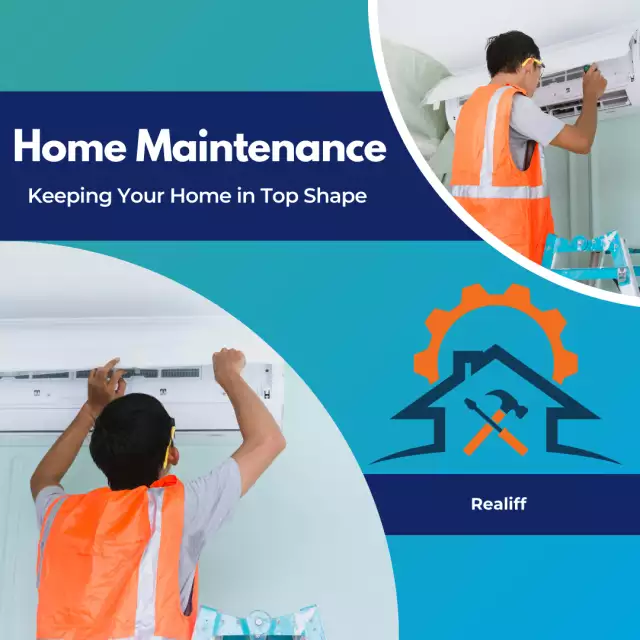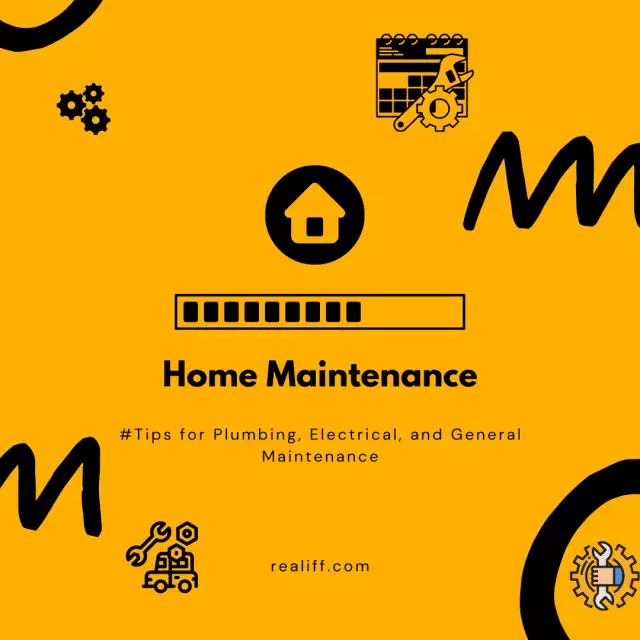Home Maintenance: Keeping Your Home in Top Shape
Your home is more than just a place to live; it's an investment that requires regular care and attention to maintain its value, safety, and comfort. Home maintenancemay seem like a daunting task, but with the right knowledge and a well-structured plan, you can keep your home in excellent condition without breaking the bank. In this blog post, we'll explore the importance of home maintenance and provide you with a comprehensive guide to help you tackle the essential tasks.
Why Home Maintenance Matters
Home maintenance is not just about keeping your property looking good; it's about safeguarding your investment and ensuring your family's well-being. Here's why it matters:
Protecting Your Investment:Your home is more than just a place to live; it's a significant financial investment. Over time, property values tend to appreciate, making your home one of the most valuable assets you'll ever own. To protect this investment, regular maintenance is essential. By addressing small issues promptly and keeping your property in good condition, you can prevent potentially costly repairs down the road. Neglecting maintenance tasks can lead to the deterioration of your home's structure and systems, which can diminish its value. In essence, investing in maintenance today is an investment in the long-term financial stability and appreciation of your home.
Safety and Comfort:Maintaining a well-kept home goes beyond financial considerations; it directly impacts your safety and comfort. Regular maintenance routines ensure that your home remains a safe and secure environment for you and your family. By promptly addressing issues such as electrical problems, plumbing leaks, or structural weaknesses, you can significantly reduce the risk of accidents or emergencies within your home. Moreover, a well-maintained home contributes to a healthier living environment by preventing issues like mold growth or pest infestations. Ultimately, when you prioritize home maintenance, you're investing in the well-being and peace of mind of everyone who lives there.
Energy Efficiency:In today's environmentally conscious world, energy efficiency is a critical factor to consider when maintaining your home. Proper maintenance practices can make your home more energy-efficient, which offers several benefits. Firstly, it helps lower your utility bills, saving you money in the long run. By regularly servicing your heating, cooling, and insulation systems, you can ensure they operate at peak efficiency, reducing energy waste. Secondly, improving energy efficiency reduces your environmental footprint, as it requires fewer resources to power and heat your home. It's a responsible choice that not only benefits your wallet but also contributes to a more sustainable future for our planet. In essence, maintaining an energy-efficient home is a win-win for both your finances and the environment.
Creating a Home Maintenance Schedule
To stay on top of home maintenance, it's crucial to establish a schedule. Here's a breakdown of maintenance tasks by frequency:
Yearly Maintenance: Tasks like inspecting your roof, cleaning gutters, and servicing your HVAC system should be done annually.
Seasonal Maintenance: This includes tasks such as cleaning windows in the spring, preparing your HVAC for summer and winter, and sealing gaps and cracks in the fall.
Monthly Maintenance: Change HVAC filters monthly, test smoke detectors, and check for plumbing leaks.
Exterior Home Maintenance
Roof and Gutters:Regularly inspecting your roof and gutters is crucial for the overall well-being of your home. Start by checking for damaged or missing shingles or tiles. Damaged roofing materials can lead to leaks and water damage, which can be costly to repair. By identifying and addressing these issues promptly, you can prevent further damage to your home's interior. Additionally, don't forget to clean your gutters. Clogged gutters can lead to water overflow, potentially damaging your foundation and siding. Routine gutter cleaning ensures that rainwater flows away from your home as intended, protecting it from water-related issues.
Siding and Paint:The exterior of your home, including siding and paint, plays a vital role in protecting it from the elements. To maintain your home's integrity, inspect your siding for signs of damage or wear, such as cracks, rot, or peeling paint. Repaint as needed to provide a protective barrier against weathering and decay. A fresh coat of paint not only enhances your home's appearance but also prevents moisture from infiltrating your siding, which can lead to costly repairs. Regular inspections and maintenance of your siding and paint are essential to safeguarding your home's structural integrity.
Windows and Doors:Efficient windows and doors are essential for maintaining a comfortable and energy-efficient home. Check for drafts around your windows and doors, as these can lead to energy loss and discomfort. Repair or replace weatherstripping to eliminate drafts and improve insulation. Additionally, lubricate hinges and locks to ensure smooth operation and security. Properly maintained windows and doors not only enhance your home's energy efficiency but also contribute to its overall safety and convenience.
Landscaping and Yard Maintenance:Your home's curb appeal is not just about aesthetics; it also influences the condition of your property. Regular landscaping and yard maintenance are essential for keeping your home in top shape. Trim trees and shrubs away from the house to prevent branches from damaging your roof or siding during storms. Cleaning debris from the yard not only improves its appearance but also reduces the risk of pests and moisture-related issues. Repair any damaged pathways or fences to enhance safety and accessibility. Investing in landscaping and yard maintenance not only boosts your home's visual appeal but also ensures its long-term durability and functionality.
Interior Home Maintenance
Plumbing and Water Systems: Check for leaks, fix drips promptly, and ensure your water heater is well-maintained.
Electrical Systems: Test outlets and switches, replace damaged cords, and have an electrician address any issues.
HVAC (Heating, Ventilation, and Air Conditioning): Schedule professional maintenance annually to ensure efficient operation.
Kitchen and Appliances: Clean appliances regularly and check for leaks in plumbing connections.
Bathroom Maintenance: Address any plumbing issues, replace caulking, and clean or replace grout.
Home Safety and Security
Fire Safety: Ensuring fire safety in your home is paramount to protect your family and property. One of the most crucial steps is to install smoke detectors and carbon monoxide detectors in strategic locations throughout your home. Smoke detectors are designed to alert you to the presence of smoke, indicating a potential fire, while carbon monoxide detectors detect dangerous levels of this odorless, deadly gas. These devices provide early warnings that can make a life-saving difference in the event of an emergency. It's essential not only to install them but also to check them regularly to ensure they are functioning correctly. Change the batteries as needed, and replace the detectors as recommended by the manufacturer. Fire safety measures like these are a fundamental part of responsible homeownership.
Home Security Systems: Home security is a critical aspect of safeguarding your property and peace of mind. Consider installing a home security system or upgrading your existing one to provide comprehensive protection against intruders and potential threats. Modern home security systems offer a range of features, including motion sensors, door/window sensors, surveillance cameras, and alarm systems. These components work together to detect and deter unauthorized access to your home. Additionally, many systems can be monitored remotely, allowing you to keep an eye on your property even when you're away. Investing in a reliable home security system not only protects your valuables but also provides a sense of security and confidence in your home's safety. It's a proactive measure that can help prevent break-ins and provide timely responses in case of emergencies, ensuring that your home remains a secure and protected environment.
Budgeting for Home Maintenance
Setting aside a portion of your budget for home maintenance is a prudent financial strategy that can bring peace of mind and stability to your homeownership journey. Owning a home comes with the responsibility of ongoing upkeep and the potential for unexpected expenses, making it crucial to be prepared for unforeseen repairs. By establishing an emergency fund dedicated to home-related costs, you not only demonstrate financial preparedness but also alleviate the stress and uncertainty that often accompany unexpected home repairs. This fund acts as a financial safety net, ensuring that you have the means to cover unforeseen expenses without resorting to high-interest loans or depleting your savings. Furthermore, having a designated fund encourages you to address minor maintenance issues promptly, preventing them from escalating into more significant and costly problems. It promotes budgeting discipline and long-term savings, allowing you to maintain and enhance your home's value and comfort while securing your financial well-being.
DIY vs. Professional Maintenance
Know your limits. While some tasks can be DIY projects, others require professional expertise. Don't hesitate to call in experts when needed.
Record Keeping
Keep detailed records of maintenance and repairs. This helps you track expenses, warranties, and upcoming tasks.
Conclusion
Home maintenance is a vital aspect of homeownership that should not be overlooked. By following a structured maintenance schedule and addressing issues promptly, you can keep your home safe, comfortable, and in excellent condition for years to come. Remember, a well-maintained home is a happy and valuable home.





